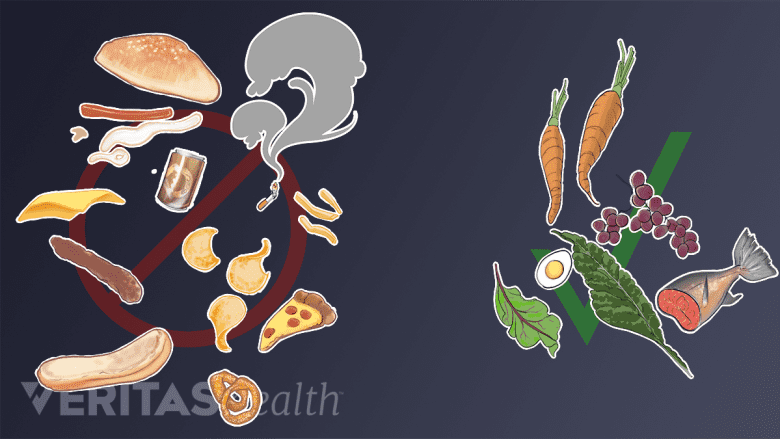The goal of an anti-inflammatory diet for arthritis is to reduce unnecessary inflammation and the joint degeneration and pain it causes.
In This Article:
Inflammatory Foods to Avoid
According to many experts, certain foods seem to promote inflammation and should be avoided.
- Processed foods, such as commercial baked goods and bars and many prepackaged meals
- Red meat
- Refined grain products, such as white bread and white pasta
- Refined sugar and refined sugar products, such as candy and soda
- Deep-fried foods
- Certain oils, including corn, safflower, soy, and peanut oils
- Dry roasted nuts and beer nuts
See Foods to Avoid with Fibromyalgia
Grocery stores are filled with processed foods and sugary drinks—too many to list here—so this list is merely a guideline. People are encouraged to read food labels and avoid foods that contain ingredients such as refined sugar, corn syrup, refined flour, and corn oils.
Anti-Inflammatory Foods Central to an Anti-inflammatory Diet
Following proper nutrition may help to reduce unnecessary inflammation.
Chemical compounds found naturally in many foods, including most fruits and vegetables, seem to have anti-inflammatory properties. Certain anti-inflammatory foods, like the ones listed below, are highly recommended.
- Cold water fish, such as tuna, salmon, mackerel, sardines, bass, and anchovies
- Fresh and (additive-free) frozen fruits, including apples, apricots, bananas, berries, cantaloupe, grapes, kiwi fruit, oranges, papaya, pineapple, and avocados
Watch: Video: Reduce Arthritis Inflammation with this Delicious Smoothie
- Certain oils, including flaxseed and olive oils
- Nuts, including almonds, walnuts, and macadamia nuts
- Deep green vegetables such as spinach, kale, swiss chard, collards, and broccoli
- Other vegetables such as cabbage, carrots, cauliflower, celery, onions, and sweet potatoes
- Certain spices, including ginger and turmeric
- Green tea and water, particularly mineral water
- Whole grains, including wheat, rice, barley, buckwheat, bulgur wheat, millet, oats, quinoa, and spelt
- Flaxseeds, chia seeds, and tofu
Watch: Video: The Best-Tasting Anti-Inflammatory Cocktail You've Never Tried
Fish, vegetable oils, walnuts, flax seeds, flaxseed oil, chia seeds, and leafy vegetables are especially high in omega-3 fatty acids (sometimes called n-3 fatty acids). Evidence shows that a diet that includes omega-3 fatty acids can lead to a modest reduction in symptoms for patients with rheumatoid arthritis.1Stamp LK, James MJ, Cleland LG. Diet and rheumatoid arthritis: a review of the literature. Semin Arthritis Rheum. 2005 Oct;35(2):77-94. Review. PubMed PMID: 16194694.
Just because a food is not on the above list does not mean it cannot be part of an anti-inflammatory diet. There are many varieties of vegetables and fruits, whole grains, nuts, beans, and lean fish, so people can take advantage of this diversity to enjoy a delicious and varied diet.
3 Controversial Foods in an Anti-Inflammatory Diet
Some foods that are normally considered part of a healthy diet may cause inflammation in some people. Common examples of these foods are nightshade plants, dairy products, and wheat gluten.
- Nightshade plants
Eggplant, pepper, white potatoes and tomatoes are collectively called “nightshade” plants. These plants contain a chemical called solanine, which some people believe promotes arthritis inflammation.The Arthritis Foundation does not support the position that nightshade plants cause arthritis inflammation but does acknowledge that some people may be sensitive to certain vegetables.
- Dairy products
Over the years researchers have found that dairy products are associated with many benefits, such as reducing the risk of gout in men2Choi HK, Atkinson K, Karlson EW, Willett W, Curhan G. Purine-rich foods, dairy and protein intake, and the risk of gout in men. N Engl J Med. 2004 Mar 11;350(11):1093-103. PubMed PMID: 15014182. and slowing down the progression of osteoarthritis in women.3Lu B, Driban JB, Duryea J, McAlindon T, Lapane KL, Eaton CB. Milk consumption and progression of medial tibiofemoral knee osteoarthritis: data from the Osteoarthritis Initiative. Arthritis Care Res (Hoboken). 2014 Jun;66(6):802-9. doi: 10.1002/acr.22297. PubMed PMID: 24706620; PubMed Central PMCID: PMC4201042. Low-fat yogurt, cheese and milk can be particularly beneficial. However, in certain people, dairy products may produce inflammation that affects the joints.4Fitzgerald K. A case report of a 53-year-old female with rheumatoid arthritis and osteoporosis: focus on lab testing and CAM therapies. Altern Med Rev. 2011 Sep;16(3):250-62. PubMed PMID: 21951026.
- Wheat gluten
Like dairy products, whole-wheat products can be part of a healthy diet. However, a protein found in wheat, called gluten, is associated with inflammation and joint pain in certain individuals.
People with an allergy or sensitivity to gluten should not eat wheat, barley or bulgur wheat. They should also avoid oats that are not labeled gluten free. (Oats are naturally gluten free, but many oat crops are grown in rotation with wheat and barley crops and are therefore cross-contaminated.)
See Ingredients That May Trigger Fibromyalgia Symptoms
Food allergies and sensitivities vary from person to person. Individuals may need to work with a health care provider or nutritionist to find an optimal, tailored anti-inflammatory diet.
- 1 Stamp LK, James MJ, Cleland LG. Diet and rheumatoid arthritis: a review of the literature. Semin Arthritis Rheum. 2005 Oct;35(2):77-94. Review. PubMed PMID: 16194694.
- 2 Choi HK, Atkinson K, Karlson EW, Willett W, Curhan G. Purine-rich foods, dairy and protein intake, and the risk of gout in men. N Engl J Med. 2004 Mar 11;350(11):1093-103. PubMed PMID: 15014182.
- 3 Lu B, Driban JB, Duryea J, McAlindon T, Lapane KL, Eaton CB. Milk consumption and progression of medial tibiofemoral knee osteoarthritis: data from the Osteoarthritis Initiative. Arthritis Care Res (Hoboken). 2014 Jun;66(6):802-9. doi: 10.1002/acr.22297. PubMed PMID: 24706620; PubMed Central PMCID: PMC4201042.
- 4 Fitzgerald K. A case report of a 53-year-old female with rheumatoid arthritis and osteoporosis: focus on lab testing and CAM therapies. Altern Med Rev. 2011 Sep;16(3):250-62. PubMed PMID: 21951026.


